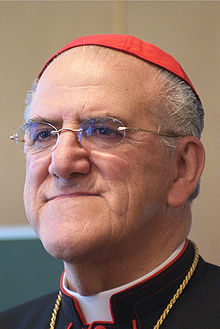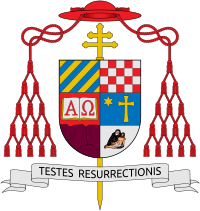Javier Lozano Barragán
His Eminence Javier Lozano Barragán | |
|---|---|
| President Emeritus of the Pontifical Council for Pastoral Assistance to Health Care Workers | |
 Lozano Barragán in 2006 | |
| Appointed | 7 January 1997 |
| Term ended | 18 April 2009 |
| Predecessor | Fiorenzo Angelini |
| Successor | Zygmunt Zimowski |
| Other post(s) | Cardinal Priest of S. Dorotea |
| Previous post(s) |
|
| Orders | |
| Ordination | 30 October 1955 by Carlo Confalonieri |
| Consecration | 15 August 1979 by Ernesto Corripio y Ahumada |
| Created cardinal | 21 October 2003 by Pope John Paul II |
| Rank | Cardinal Priest |
| Personal details | |
| Born | 26 January 1933 Toluca, Mexico |
| Died | 20 April 2022 (aged 89) Rome, Italy |
| Denomination | Roman Catholic |
| Coat of arms |  |
| Styles of Javier Lozano Barragán | |
|---|---|
 | |
| Reference style | His Eminence |
| Spoken style | Your Eminence |
| Informal style | Cardinal |
| See | Zacatecas |
Javier Lozano Barragán (Spanish pronunciation: [xaˈβjeɾ loˈsano βaraˈɣan]; 26 January 1933 – 20 April 2022) was a Mexican prelate of the Catholic Church who was president of the Pontifical Council for the Pastoral Care of Health Care Workers from 1997 to 2009. He was made a cardinal in 2003. He was auxiliary bishop of the Archdiocese of Mexico from 1979 to 1984 and bishop of Zacatecas from 1984 to 1997.
Early life and education
Born in Toluca, State of México, on 26 January 1933, Lozano Barragán trained at the seminary in Zamora, Michoacán, and was ordained a priest on 30 October 1955 while studying in Rome, where he earned a doctorate in dogmatic theology at the Pontifical Gregorian University in 1958. Returning to Mexico, he taught at the seminary in Zamora In the 1970s he served as president first of the Mexican Theological Society and then of the Theological Pastoral Institute of the Latin American Episcopal Council (CELAM).[1]
Bishop
On 5 June 1979, Lozano Barragán was appointed auxiliary bishop of the Archdiocese of Mexico. He received his episcopal consecration on 15 August from Cardinal Ernesto Corripio y Ahumada, Archbishop of Mexico.[citation needed] While in that position, he helped to found the Pontifical University of Mexico and served on its leadership council from 1982-1985.[2]
On 28 October 1984 he was named bishop of Zacatecas. While in that post he was made a member of two Curial bodies, the Pontifical Council for Dialogue with Non-Believers and the Congregation for the Evangelization of Peoples.[2]
Curial service
On 31 October 1996 he was appointed president of the Pontifical Council for the Pastoral Care of Health Care Workers and given the personal title of archbishop.[3]
Lozano Barragán was made Cardinal-Deacon of San Michele Arcangelo a Pietralata by Pope John Paul II on 21 October 2003.[4]
Upon the death of Pope John Paul, he was one of many crediting him with miracles, citing the case of a four-year-old Mexican boy who recovered from leukemia without explanation after the pope hugged and kissed him on a visit to Zacatecas in 1990.[5]
Lozano Barragán was one of the cardinal electors who participated in the 2005 papal conclave that selected Pope Benedict XVI.[6]
In 2006 Pope Benedict asked Lozano Barragán to prepare a report on condoms and AIDS to allow Curia officials to study "both the scientific and technical aspects linked to the condom, as well as the moral implications in all their amplitude". He downplayed reports that it was anything more than a study and said "we are in the first stage" and that it was scientific in nature and would not extend to assessing morality.[7]
On two occasions he opposed the withdrawal of life-sustaining treatments, including artificial nutrition and hydration (ANH), from patients had spent years in a vegetative state. In 2005, when Terry Schiavo died after the withdrawal of life support after 15 years, he said: "Let’s stop with the euphemisms—they killed her."[2] In 2009, he called the withdrawal of ANH from Eluana Englaro after 17 years "monstrous and inhuman murder".[8]
On 18 April 2009, Pope Benedict accepted Lozano Barragán's resignation for reasons of age and appointed Zygmunt Zimowski to the post.[9]
In retirement
The following December, Lorenzo Barragán condemned the use of the RU-486 pill as "a crime that demands punishment". He described its authorization as "worse than liberalizing the sake of weapons".[10] That same month, he discussed the Church's teaching on homosexuality and salvation. He said media reports attributing to him the view that homosexuals can not be saved had misconstrued his reference to Saint Paul's Letter to the Romans which condemns individual homosexuals.[11] He said scripture can not be used to condemn all homosexuals. Rather, he said that "many times one is not a homosexual through one's own fault; it all depends on one's education and environment." He offered the view "that for grave fault to exist, in addition to needing grave matter, one needs full knowledge and full consent: Where one of those three conditions is lacking, there is no grave fault."[12]
Having been ten years as a cardinal deacon, he was promoted to Cardinal-Priest of Santa Dorotea by Pope Francis on 12 June 2014.[13]
Lozano Barragán died in Rome on 20 April 2022.[1] In offering his condolences, Pope Francis noted they had been friends since 1980.[2]
References
- ^ a b "Pope sends condolences for death of Cardinal Javier Lozano Barragán". Vatican News. 20 April 2022. Retrieved 20 April 2022.
- ^ a b c d Mares, Courtney (20 April 2022). "Mexican Cardinal Javier Lozano Barragán has died at the age of 89". Catholic News Agency. Retrieved 21 April 2022.
- ^ "Cardinal: Gays "will never enter the Reign of God"". America Magazine. 2 December 2009. Retrieved 12 July 2022.
- ^ "Assignment of the Titles or the Deaconries to the new Cardinals". The Holy See. Office of Papal Liturgical Celebrations. 21 October 2003. Archived from the original on 19 August 2016. Retrieved 21 April 2022.
- ^ "Reports of Pope's miracles flood in". Sydney Morning Herald. 12 April 2005. Retrieved 21 April 2022.
- ^ "Elenco degli Em.mi Cardinali che entrano in Conclave secondo il loro rispettivo ordine di precedenza (Vescovi, Presbiteri, Diaconi)" [List of the Eminent Cardinals entering into Conclave according to their respective order of precedence (Bishops, Priests, Deacons)]. Sala Stampa della Santa Sede (in Italian). 18 April 2005. Archived from the original on 9 March 2014. Retrieved 21 April 2022.
- ^ "Vatican clarifies its condoms-AIDS study". Zenit. 25 April 2006. Archived from the original on 22 December 2007. Retrieved 21 April 2022.
- ^ Zulueta, Paquita de; Carelli, Francesco (2009). "Permanent vegetative state: comparing the law and ethics of two tragic cases from Italy and England". London Journal of Primary Care. 2 (2): 125–9. doi:10.1080/17571472.2009.11493266. PMC 4222155. PMID 25949590.
- ^ "Rinunce e Nomine, 18.04.2009" (Press release) (in Italian). Holy See Press Office. 18 April 2009. Retrieved 21 April 2022.
- ^ "Card. Barragan: Ru486 e' un crimine" (in Italian). ANSA. 2 December 2009. Retrieved 21 April 2022.
- ^ Romans 1:26–27
- ^ Colina, Jesús. "Cardinal: Statement on gays was misrepresented". Zenit. Archived from the original on 8 December 2009. Retrieved 21 April 2022.
- ^ "Assegnazione del titolo presbiterale ad alcuni cardinali diaconi creati nel consistoro del 21 ottobre 2003" (in Italian). 12 June 2014. Retrieved 14 June 2014.
External links
- "Lozano Barragán Card. Javier". Holy See Press Office. Archived from the original on 4 September 2017. Retrieved 26 November 2017.
- "Javier Cardinal Lozano Barragán". Catholic Hierarchy.
